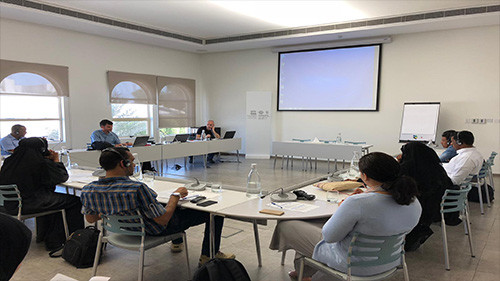21 October 2018
Attended by Yemenis and International Experts and Trainees, The Arab Regional Centre for World Heritage’s 2nd Workshop on Socotra, Yemen


It is said that the long-neglected island Socotra is now home to a large number of endangered species wherein up to a third of its plant life is endemic and could be found nowhere else on earth but Socotra. A workshop got under way in Bahrain on 21 October 2018 y as part of efforts to launch a two-year cultural preservation programme on the island of Socotra in Yemen. The workshop, titled 'Integrating Cultural Heritage into Conservation and Development Planning', is being held at the Arab Regional Centre for World Heritage (ARC-WH) from Sunday until Thursday, with the participation of 8 Yemenis trainees and 7 expert supervisors and trainers, representing cultural heritage documentation, archaeology and plants’ science. Arab Regional Centre for World Heritage organizes this workshop, in cooperation with the Royal Botanical Gardens of Edinburgh (UK) and sponsored by British Council Bahrain for five successive days.
This is the second workshop hosted by the ARC_WH after the last held in February 2018 as part of a two-year continuous programme. This 30 month project will address the needs of cultural heritage on Socotra, a Yemeni archipelago between Yemen and the Horn of Africa, as well as conducting activities to promote the use of the endangered Socotra language. The workshop will focus on both the training in and further protection the Socotra language through poetry competitions. The project also has a sustainable cultural tourism component, which was presented during the annual meeting ‘Friends of Socotra’. Indeed, Socotra is rich in unique biodiversity and has a range of cultural heritage, ranging from rock art and other prehistoric monuments to build heritage such as cemeteries and medieval buildings. The rapidly growing population of Socotra is being further swollen due to conflict in mainland Yemen, which is increasing the demand for development and putting heritage on the islands at risk. The arrival of large numbers of newcomers with little affinity to local heritage has also led to direct damage, including graffiti on rock art panels. The endangered Socotra language is also further threatened as the proportion of residents on the island who speak it diminishes.
In this 30 month project, experts based in the UK and Germany will work with Yemenis in the creation of a database of Socotra heritage, providing training on how to maintain and work with this new resource. This training will be used to generate at least 40 threat assessments and the use of the database will be integrated into holistic approaches for the maintenance of heritage in Socotra. In addition to this, poetry competitions will be held to celebrate the Socotra language and local school pupils will be invited to visit newly recorded, local cultural heritage sites and participate in workshops. The training programme will further include panel discussions, scientific dialogues of experts and specialists in the fields of conservation of natural and cultural heritage, and field visits to different parts of Bahrain. Participants will also learn to document heritage in various ways such as interviews, photography and other techniques.
The ARC-WH had previously coordinated with Cultural Heritage Protection in Socotra to publish a study on the rock arts in the island, dealing with the threats that these per-historic drawings face, given the challenging circumstances. The island embraces many artifacts dating back to different historical periods, including prehistoric drawings found in more than 40 caves scattered around the island, archaeological sites dating date back to the Hadhramawt era and Sabean dynasty, historical remains and an Islamic fort, dating back to the Mahri tribes, who came originally from areas near Qishin on the Arabian mainland. Despite numerous archaeological excavations and surveys there was scant evidence of the trade purported in historical texts, and little was known about either the sea traders visiting the island or the interior inhabitants believed to be supplying them with these products. The first unequivocal evidence we have to support these historical accounts came from Hoq hūq), a cave situated on the north side of the island. The corpus of inscriptions found within Hoq shows that Socotra was being visited by sea traders from as far afield as India, South Arabia, Ethiopia, Egypt, and Palmyra from the first century BC to the sixth century AD.
Worth to mention that the 2nd workshop on 'Integrating Cultural Heritage into Conservation and Development Planning' precedes the 17th International Socotra Conference and AGM of the Friends of Socotra in Bahrain 25–28 October 2018, Hosted by the Arab Regional Centre for World Heritage Manama, Bahrain with the theme Natural and Cultural Linkages on Socotra.
The Arab Regional Center for World Heritage is working dedicatedly to preserve the neglected island which includes large numbers of plant species, reptiles, birds and marine animals that are not found anywhere else in the world and distinguish it from other natural sites.
In addition, in 2016, the Arab Regional Centre for World Heritage (ARCWH) had also previously organized at its office in Manama an international conference meeting to discuss and develop an emergency response plan for Socotra archipelago, Yemen after 2015 cyclone. In 2016, an experts meeting was also held at the ARC_WH headquarters to discuss the best TABEA strategic plans to protect the Socotra archipelago site. In addition, the Arab Regional Centre for World Heritage (ARC-WH) launched June 2017 TABE'A II Report - enhancing regional capacities for World Heritage, and to meet the specific needs of states, stakeholders and sites within the region and ensure World Heritage contribution to IUCN's wider regional programme and the Regional Centre's strategy. In 2017, an ARC-WH delegation took part in a workshop on “ Launching the Comprehensive Program for Safeguard and Sustainable Development in Socotra Archipelago”, held in Jordan, in addition to ARC_WH’ participation in “Friends of Socotra” conference, held in Switzerland.







